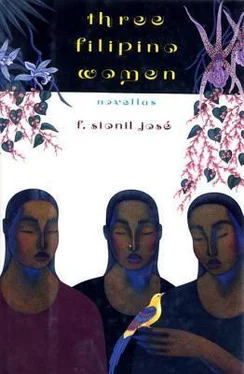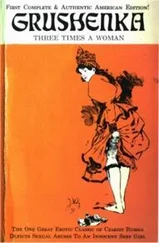Francisco Jose - Three Filipino Women
Здесь есть возможность читать онлайн «Francisco Jose - Three Filipino Women» весь текст электронной книги совершенно бесплатно (целиком полную версию без сокращений). В некоторых случаях можно слушать аудио, скачать через торрент в формате fb2 и присутствует краткое содержание. Год выпуска: 2013, ISBN: 2013, Издательство: Random House Publishing Group, Жанр: Современная проза, на английском языке. Описание произведения, (предисловие) а так же отзывы посетителей доступны на портале библиотеки ЛибКат.
- Название:Three Filipino Women
- Автор:
- Издательство:Random House Publishing Group
- Жанр:
- Год:2013
- ISBN:978-0-307-83028-9
- Рейтинг книги:4 / 5. Голосов: 1
-
Избранное:Добавить в избранное
- Отзывы:
-
Ваша оценка:
- 80
- 1
- 2
- 3
- 4
- 5
Three Filipino Women: краткое содержание, описание и аннотация
Предлагаем к чтению аннотацию, описание, краткое содержание или предисловие (зависит от того, что написал сам автор книги «Three Filipino Women»). Если вы не нашли необходимую информацию о книге — напишите в комментариях, мы постараемся отыскать её.
and
-examine the Philippine experience through the lives of three female characters, a prostitute, a student activist, and a politician.
Three Filipino Women — читать онлайн бесплатно полную книгу (весь текст) целиком
Ниже представлен текст книги, разбитый по страницам. Система сохранения места последней прочитанной страницы, позволяет с удобством читать онлайн бесплатно книгу «Three Filipino Women», без необходимости каждый раз заново искать на чём Вы остановились. Поставьте закладку, и сможете в любой момент перейти на страницу, на которой закончили чтение.
Интервал:
Закладка:
Then, the three months were over. Back in Manila, I wanted to rush to Camarin but I must test my will. For weeks I did not go although twice in that period, one of my staffers called up Didi for her girls. In the third week, my determination collapsed.
Didi was at her usual table and she asked why I had kept away so long. A business trip, I explained. And Ermi?
“She left about two weeks ago,” she said.
I regretted my foolishness. I damned myself.
“For the United States,” Didi continued. “You must have missed her a lot.”
I nodded. “Will she stay there long?”
“Maybe two months, maybe two years.”
It was just as well then, I consoled myself. Her protracted absence, about which I could do nothing, would be my final cure.
Martial law came and for the first time in my operation, everything went awry as the rules were changed. The media targets were more easily defined for there was no longer a free press and all the owners of media were either friends or relatives of the occupant of Malacañang. Gathering economic data was both easy and difficult. All that one had to know was the pattern of new elite relationships, the regions where the entrepreneurs came from. But now, government information sources were very secretive and what were once normal public documents were regarded as state secrets. One clear pattern emerged — the centralization of corruption and a thrust towards the building of infrastructures for export that depressed wages and gave new and dazzling capital sources to a favored few. I had heavily invested in the construction of a modest office building in Makati and put money in blue chip stocks. I was a segurista —I was not going to gamble with the little money I had made. Although more multinationals were coming, there was much less work for us now and I was forced to let some of my top people go along with a third of the work force. I also had to sell the office building to meet not just current obligations but the growing inflation. My mistake was not in forging the right connections early enough. In retrospect, even if I had, I would not have been able to do much for I was never really that close to the new oligarchs. They set up a similar company which naturally got all the new businesses plus a lot of what I used to have.
I should not complain too much; I was not badly off in the end, unlike some of my friends in media who lost their franchises, their newspapers and the positions of prestige they once held.
I was soon to see some acquaintances who were virtual paupers in 1966 become multimillionaires in 1976, with newspapers, ranches in Mindoro and timberlands in Palawan, all of them rich enough to buy majority holdings in established companies which the new dispensation wanted to take over.
How easily fortunes have changed, I thought, even for Ermi who had disappeared in the gilded vastness of America. I sometimes called Didi to ask if she had returned, only to learn that she never even sent a card to her madam. Perhaps, by now, she had dropped out of the trade; perhaps I would never see her again. I thought that time and distance would obliterate memories of her; these were the simplest tools with which to drain or cleanse the mind. But these were not enough.
It was a warm March afternoon and I was browsing in my favorite bookshop on Padre Faura when I sensed, when I knew, she was there. She did not see me at the far corner, among the history books, but I saw her at once. Now I realized with a pang both of sorrow and exaltation that I had never stopped caring. I crouched low before the Philippine shelves and moved towards the Asian shelves so I could have a better look. She was going through the samples of wrapping paper for which the bookshop was noted and was admiring a sheet with a big cartoon rendition of an elephant. She was in a green print dress with small yellow flowers, her hair almost brownish in the light. She had slimmed, perhaps by ten pounds. I have never been fond of voluptuous women anyway, leaving those to Rubens or Boticelli. Looking at her, how could I keep away? How could I deny myself again? To be with her was a compulsion, a mesmeric force. The moth flew at the flame.
She was asking the salesgirl how much the sheet cost. I stood up then and went to her, my heart thrashing wildly, my throat as dry as a riverbed in April. I did not speak. She turned, recognized me at once.
“Roly, this is a surprise …”
“I am here almost every Saturday afternoon,” I said. “I live close by.”
“I have not forgotten.”
I asked where she was going from the bookshop. She was evasive as usual. I must not lose track of her ever again so I asked if I could take her home but she said no — no one ever took her home.
“I’d like to be your friend, Ermi,” I said. I had told her that once before and she had said it was impossible for a man to be a real friend of a woman like her. That friendship would surely end in bed and the relationship would then be irrevocably altered.
She smiled and shook her head.
“Please, I would like to see you again.”
“You can always get in touch with me at Camarin.”
I was surprised; I had thought she had given up the trade.
“No, I would like to take you out. Tomorrow, Sunday. Anytime you want, anywhere you please …”
I went out with her to the street. Her manner was abrupt. “Don’t follow me,” she said. “I have an appointment. But tomorrow …” She seemed to give the idea some thought. “Ten o’clock at the east entrance to Rustan’s in Cubao. Do you know the place?”
I nodded. She shook my hand then turned towards Mabini where she hailed a cab.
Ten o’clock. The night before, I barely slept thinking how it would be, the important things I would tell her. She was prompt. She was in blue jeans and a white blouse with red flowers, her face lightly made up. The day was unusually muggy and warm and was, so I learned the day after, the hottest day of the year. Her brow was moist so I let her use my handkerchief.
“Let’s go see a movie,” she said tentatively. “But I can see one any time. Why don’t we go somewhere else instead?”
My whole day was for her. “Let’s go to Calamba,” I said.
She did not know much about Rizal or his novels, and she had not even visited Fort Santiago though she had lived in Manila much of her life.
“Shame on you,” I said. “You have no sense of history.”
“The past be damned,” she said with a viciousness which surprised me.
I asked why she chose Cubao as our meeting place and she said she lived in the area.
“And what about your house in Forbes Park?”
“Don’t be silly,” she said. “How can I ever live there? I am renting the house out and I have bought a much smaller one.”
I knew then that she would not end up selling sweepstakes tickets and said so.
“And what makes you think that I will end up that way?”
“Many of the girls do,” I said. “You are good for only a few years. Then you start getting old, wrinkles on the face, the breasts sag. It is then that you get loved for what you are … if you are loved.”
She was silent and that was when I said: “You will find that it will only be one man who will care for you then.”
She did not speak, as if she did not hear.
“Ermi,” I said, “before you left, I almost went crazy over you. I went away, too, for three months. What did you do in the States?”
“I saw my mother,” she said quickly. It was the first thing about her life which she had told me.
“Tell me about her.”
Her eyes were imploring. “Roly, please don’t ask questions about my family, my past. I don’t want to talk about them. It hurts, just remembering …”
I did not ask her again.
Читать дальшеИнтервал:
Закладка:
Похожие книги на «Three Filipino Women»
Представляем Вашему вниманию похожие книги на «Three Filipino Women» списком для выбора. Мы отобрали схожую по названию и смыслу литературу в надежде предоставить читателям больше вариантов отыскать новые, интересные, ещё непрочитанные произведения.
Обсуждение, отзывы о книге «Three Filipino Women» и просто собственные мнения читателей. Оставьте ваши комментарии, напишите, что Вы думаете о произведении, его смысле или главных героях. Укажите что конкретно понравилось, а что нет, и почему Вы так считаете.












